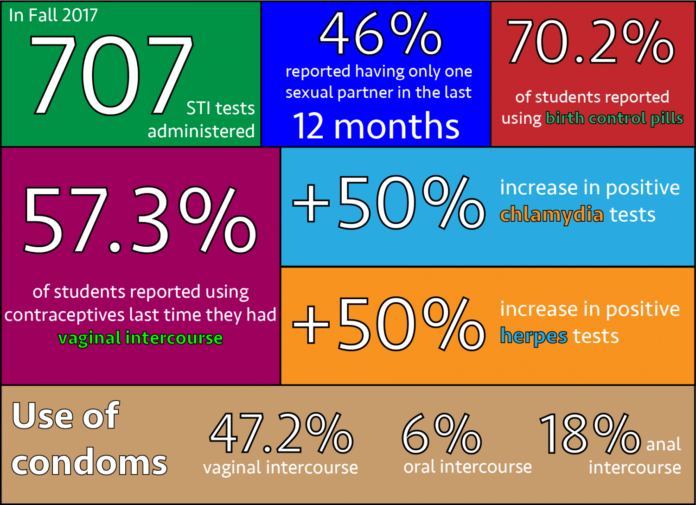One key goal for the Health Center at SRU is to make sure that students are engaging in safe sex and have the proper materials to do so.
According to Vanessa Vought, health educator for SRU Health Services, the Health Center administered 707 STI tests in the fall 2017 semester. The Health Center also distributes a survey, which is part of a national college health assessment.
According to the survey:
46.4 percent report having only one sexual partner within the last 12 months
57.3 percent report using contraception the last time they have vaginal intercourse
70.2 percent of SRU students or their partners report using birth control pills to prevent pregnancy the last time they engaged in vaginal intercourse
47.2 percent reported using a condom or protective barrier during vaginal intercourse within the last 40 days
Only 6 percent of students used protection for oral sex and 18 percent for anal intercourse
Vought also said that the university also saw an increase in positive chlamydia tests by 50 percent, as well as positive herpes tests by 50 percent, up from last year.
According to Vought it’s also important to note that these numbers are not indicative of the entire student population, only accounting for students who come to the Health Center to get services. Some STI’s, such as chlamydia are also asymptomatic, and Vought said it’s important for students to get tested.
“Chlamydia is notorious for not having any symptoms related to it,” Vought said. “That emphasizes the need that if you’re sexually active to just get the test done regularly regardless if you’re seeing symptoms or not. If you feel like you’re at any risk whatsoever, come in and get tested.”
The Health Center provides regular programming throughout the entire academic year, with programs available by request. These programs are carried out by HOPE (Healthy Outreach Through Peer Education) peer educators, comprised of SRU students.
“We use the data (from the survey) to kind of focus the information,” Vought said. “If we see a drop in STI testing we want to emphasize the point a little more, so we would just target that a little more in the programming.”
The month of February is a big month for sexual health, with Valentines Day right in the middle of the month. To coincide with this, HOPE peer educators and health services have events for the week of Feb. 12, which is also sexual responsibility week. They will be in the Smith Student Center Ballroom on Feb. 13 from 10 a.m. to 2 p.m.
The aim of the event is to promote a different side of sexual health.
“Part of our belief about sexual health is that there are a lot of different topics that relate to it,” Vought said. “Some things that are not exactly physical sexual health; like healthy relationships, love and respect.”
HOPE will also run the annual Condom Fashion Show, which is on Feb. 28 and starts at 7 p.m. Vought said most events aim to provide sexual health information in a fun way.
“We try to make those types of events a lot more fun and light-hearted because obviously the topic can be very heavy and even a little awkward,” Vought said. “We feel like the more fun and engaging it is, the easier it is to get across that information.”
The Health Center is open 24/7 and offers sexual health check-ups, STI testing and treatment, pregnancy tests, birth control prescriptions and emergency contraceptions. Vought said she will also meet with people in “option appointments”, to describe the numerous contraceptive options.
“I go through every type of birth control available and we kind of find the best that’s suitable for you,” Vought said.
Additional supplies can be bought through the Protection Connection office, where students can buy condoms, dental dams and lube. Additional condom vending machines can be found in the Boozel bathrooms and Bailey Library.
“Trojan ENZs are consistently our most popular and most sold condoms,” Vought said. “We do take requests for Safer Sex supplies, so students can request a particular brand they’d like us to stock.”
Vought, who started at SRU last semester, said she also hopes to make the HOPE Peer Educator presentations more interactive.
“We find that when these specific programs get requested in residence halls, they don’t work as well because they’re designed for classrooms,” Vought said. “We don’t want it to be just like we’re lecturing you and we’re berating you with all this information. If we make it a little more entertaining, people will be more interested in requesting it.”
Overall, Vought hopes for the stigma around sexual health to be reduced.
“I want to be able to educate for students to have an open dialogue, increase communication with your partner about STI testing, increase the importance of getting it, I want it on their radar,” Vought said. “In that we would see STI testing, see condom sales go through the roof, because they would know it would be second hand.”








